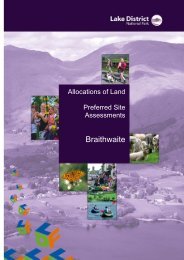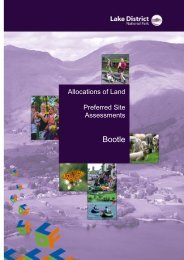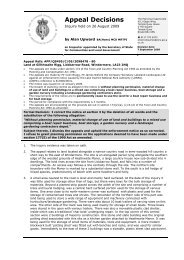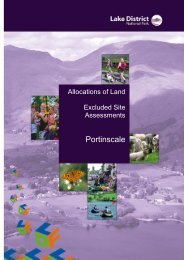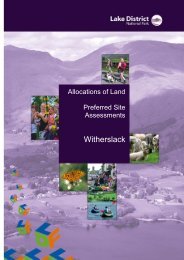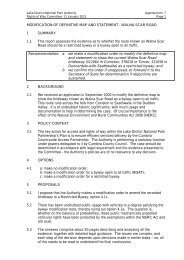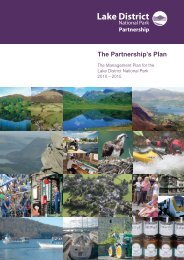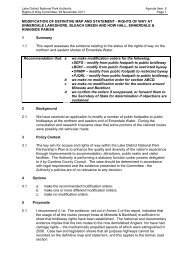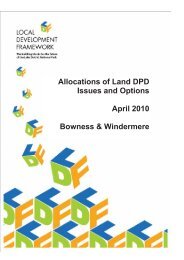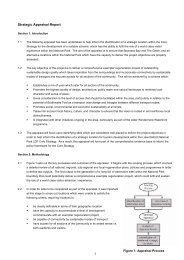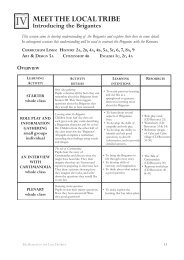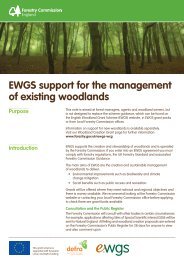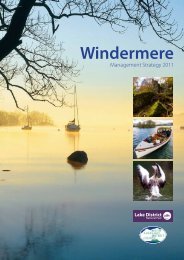2011_03_23 Travel and Subsistence Policy (pdf) - Lake District ...
2011_03_23 Travel and Subsistence Policy (pdf) - Lake District ...
2011_03_23 Travel and Subsistence Policy (pdf) - Lake District ...
You also want an ePaper? Increase the reach of your titles
YUMPU automatically turns print PDFs into web optimized ePapers that Google loves.
<strong>Lake</strong> <strong>District</strong> National Park Authority Agenda Item: 13<br />
Authority: <strong>23</strong> March <strong>2011</strong> Page 1<br />
TRAVEL AND SUBSISTENCE POLICY<br />
1 SUMMARY<br />
1.1 This report proposes a replacement policy for our current reimbursement of<br />
employee expenses policy <strong>and</strong> our motor car allowances policy.<br />
Recommendation that: a<br />
Members approve the replacement <strong>Travel</strong> <strong>and</strong><br />
<strong>Subsistence</strong> <strong>Policy</strong> as detailed in Annex 1 with effect<br />
from 1 April <strong>2011</strong>.<br />
2 BACKGROUND<br />
2.1 The existing Reimbursement of Employee Expenses <strong>Policy</strong> (staff note 2.6) was<br />
originally issued in February 1990 <strong>and</strong> last revised in April 1998. The existing Motor<br />
Car Allowances <strong>Policy</strong> (staff note 2.3) was issued in August 1993.<br />
2.2 These policies do not provide employees with clear guidance on allowances <strong>and</strong><br />
travel <strong>and</strong> subsistence expenses that can be claimed.<br />
2.3 The replacement policy aims to provide:<br />
a link with our organisational values;<br />
clear guidance for employees on allowances <strong>and</strong> travel <strong>and</strong> subsistence<br />
expenses <strong>and</strong> the associated timescales for submitting claims;<br />
a consistent, fair <strong>and</strong> equitable approach, which will mean employees will not<br />
profit from their expense claims, but will be adequately reimbursed for them.<br />
2.4 This policy should be implemented to coincide with the start of the new financial year.<br />
2.5 The key differences between the existing policies <strong>and</strong> the proposed replacement are:<br />
the removal of the essential car user allowance;<br />
revised mileage allowances with the implementation of HMRC mileage rates;<br />
the introduction of the <strong>Travel</strong> Hierarchy into meeting planning decisions;<br />
changes to overnight allowances;<br />
changes to subsistence allowances.<br />
3 POLICY CONTEXT<br />
3.1 This replacement policy supports our values. The key values relating to this policy<br />
are:<br />
we are passionate <strong>and</strong> proud of the <strong>Lake</strong> <strong>District</strong>;<br />
we are ethical <strong>and</strong> care about the environment;<br />
we value people.<br />
3.2 The policy aims to encourage employees to identify the most cost effective method<br />
of travel, with the lowest carbon impact, based on the <strong>Travel</strong> Hierarchy. A copy of the<br />
<strong>Travel</strong> Hierarchy is contained in Annex 2 for information.<br />
3.3 The policy aims to support good budget management.<br />
3.4 The policy relates to Maximising our Potential as it forms part of a framework of<br />
policies that support delivery of the Authority’s strategy.
<strong>Lake</strong> <strong>District</strong> National Park Authority Agenda Item: 13<br />
Authority: <strong>23</strong> March <strong>2011</strong> Page 2<br />
4 OPTIONS<br />
4.1 Members can:<br />
a) approve the proposed policy;<br />
b) suggest amendments to the proposed policy;<br />
c) reject the proposed policy.<br />
5 PROPOSALS<br />
5.1 It is recommended that members agree the proposed policy. It has been subject to<br />
consultation with Staff <strong>and</strong> Trade Union representatives <strong>and</strong> Executive Board <strong>and</strong><br />
has their agreement.<br />
5.2 Employees currently in receipt of an essential car user allowance have been<br />
consulted on the removal of this allowance <strong>and</strong> have agreed to this change. This<br />
allowance will be removed on 31 March <strong>2011</strong> <strong>and</strong> all employees will be casual car<br />
users.<br />
5.3 The policy is presented in Annex 1.<br />
6 BEST VALUE IMPLICATIONS<br />
6.1 In terms of challenge, by implementing this replacement policy, the Authority will<br />
reduce its costs.<br />
6.2 In terms of comparing with others, using the st<strong>and</strong>ard HMRC mileage rates appears<br />
to be good practice with many organisations.<br />
6.3 In terms of consulting, we have consulted with Staff <strong>and</strong> Trade Union representatives<br />
<strong>and</strong> all employees have been able to comment on the proposed policy via the<br />
Authority’s intranet site.<br />
7 FINANCE CONSIDERATIONS<br />
7.1 The proposed policy will reduce the cost of allowances <strong>and</strong> travel <strong>and</strong> subsistence<br />
claims within the Authority.<br />
7.2 The introduction of this policy would generate ongoing savings of around £14,000 per<br />
annum through removal of the essential car user allowance. In addition, the Authority<br />
would expect to make ongoing annual savings of around £7,000 through changes to<br />
mileage rates. This will, however, depend on the level of travel by employees. There is<br />
an expectation that further monies will be saved in relation to subsistence, however,<br />
we are not in a position to estimate these savings at this stage.<br />
8 RISK<br />
8.1 There are no significant risks with this proposal.<br />
9 LEGAL CONSIDERATIONS<br />
9.1 There are no legal considerations in relation to this policy.<br />
10 HUMAN RESOURCES<br />
10.1 Our recognised Trade Union, Unison, Staff representatives <strong>and</strong> the wider staff have all<br />
been fully consulted on this policy.
<strong>Lake</strong> <strong>District</strong> National Park Authority Agenda Item: 13<br />
Authority: <strong>23</strong> March <strong>2011</strong> Page 3<br />
10.2 The policy aims to meet our organisational values, provide adequate reimbursement<br />
<strong>and</strong> provide clear guidance that promotes good employee relations.<br />
11 DIVERSITY IMPLICATIONS<br />
11.1 This issue is of low relevance to diversity issues <strong>and</strong> there is no evidence that this will<br />
have an adverse impact on particular groups.<br />
12 SUSTAINABILITY<br />
12.1 This policy supports the Authority’s policy on reducing carbon emissions.<br />
12.2 The introduction of our new <strong>Travel</strong> <strong>and</strong> <strong>Subsistence</strong> <strong>Policy</strong> is one of a package of<br />
measures outlined in our Staff Business <strong>Travel</strong> Recommendations Report, to reduce<br />
carbon emissions from our own operations. We have reduced the average carbon<br />
emissions across our fleet by buying lower emissions fleet vehicles <strong>and</strong> introducing<br />
ultra-low emission pool cars <strong>and</strong> pool bicycles for staff to use on Authority business<br />
instead of their own higher emission cars. Staff embraced the new pool car system<br />
<strong>and</strong> the carbon emissions relating to their mileage claims reduced by 33 per cent<br />
between 2007/2008 <strong>and</strong> 2009/2010. As a result of these initiatives, we won the 2009<br />
Guardian/Energy Saving Trust Fleet heroes award for the Best Public Sector Fleet<br />
under 250 vehicles <strong>and</strong> further awards in 2010.<br />
12.3 In 2010, we introduced a travel hierarchy, based on the results of a staff survey, which<br />
was supported by the installation of video-conferencing, teleconferencing <strong>and</strong> remote<br />
working facilities. In the first nine months of 2010/<strong>2011</strong>, staff have travelled 19% less<br />
miles on Authority business compared with the same period last year. This equates to<br />
a reduction of 18.4% year to date. The introduction of this revised <strong>Policy</strong>, will reduce<br />
staff car mileage rates in line with HMRC recommendations. This will prevent<br />
appearing to incentivise staff to use their own higher emission vehicles instead of our<br />
low emission, well-maintained pool cars <strong>and</strong> help to maintain our exemplary position in<br />
fleet management.<br />
Background Papers <strong>Travel</strong> Hierarchy<br />
Author/Post<br />
Charlotte Quinn, Senior Human Resources Advisor<br />
Date Written 2 March <strong>2011</strong>
<strong>Lake</strong> <strong>District</strong> National Park Authority Agenda Item: 13<br />
Authority: <strong>23</strong> March <strong>2011</strong> Annex 1 Page 1<br />
ANNEX 1: TRAVEL AND SUBSISTENCE POLICY<br />
<strong>Travel</strong> <strong>and</strong> <strong>Subsistence</strong> <strong>Policy</strong><br />
Purpose <strong>and</strong> Scope:<br />
This policy aims to provide clear<br />
guidance on allowances <strong>and</strong> travel<br />
<strong>and</strong> subsistence expenses that can<br />
be claimed by employees of the<br />
Authority <strong>and</strong> the time frames in<br />
which they can be claimed. This<br />
<strong>Policy</strong> does not cover expenses<br />
incurred as a result of relocation of<br />
work base, for which a separate<br />
policy exists.<br />
Applicable to:<br />
All Employees<br />
Staff<br />
Chief Officers<br />
Chief Executive<br />
Members<br />
X<br />
X<br />
X<br />
X<br />
Key Principles:<br />
Throughout the authority, the aim will be to ensure that expenses are only incurred,<br />
reimbursed <strong>and</strong> claimed in line with our values. The values most appropriate to this policy are:<br />
We are passionate <strong>and</strong> proud of the <strong>Lake</strong> <strong>District</strong><br />
We are ethical <strong>and</strong> care about our environment<br />
We value people<br />
In an effort to achieve this, the key principles that this policy will work to are as<br />
follows:<br />
<br />
<br />
<br />
This policy aims to encourage employees to identify the most cost effective method of<br />
travel with the lowest carbon impact, based on the <strong>Travel</strong> Hierarchy<br />
This policy will ensure that whilst employees don’t profit from their expense claims,<br />
they are adequately reimbursed for expenses<br />
This policy aims to support good budget management<br />
Content List:<br />
1.0 Public Transport<br />
2.0 Car Allowances <strong>and</strong> Mileage Rates<br />
3.0 Overnight Allowances<br />
4.0 <strong>Subsistence</strong> Allowances<br />
5.0 Flow Chart<br />
How the Principles will be applied:<br />
It is important before any travel is undertaken, that employees consult the <strong>Travel</strong> Hierarchy<br />
<strong>and</strong> determine whether the journey is necessary <strong>and</strong> whether it can be undertaken in any<br />
other way.<br />
1.0 Public Transport<br />
Reimbursement of the cost of second class public transport, will be authorised by your line
<strong>Lake</strong> <strong>District</strong> National Park Authority Agenda Item: 13<br />
Authority: <strong>23</strong> March <strong>2011</strong> Annex 1 Page 2<br />
manager on HR Pro within 60 days of the travel taking place. Valid receipts for claims should<br />
be sent to Finance. Employees must make every effort to identify the cheapest available fare<br />
through advanced bookings <strong>and</strong> using our business account on trainline.com.<br />
2.0 Car Allowances <strong>and</strong> Mileage Rates<br />
The Authority is committed to reducing its carbon impact. In order to support the achievement<br />
of this corporate objective, it has invested in teleconferencing <strong>and</strong> video conferencing facilities<br />
<strong>and</strong> introduced a <strong>Travel</strong> Hierarchy. Where the use of a car is necessary, the authority has<br />
provided a range of economical <strong>and</strong> more environmentally friendly pool cars <strong>and</strong> Authority<br />
vehicles for staff to use in the fulfilment of their duties.<br />
If it is not possible to access a pool car or Authority vehicle, then you will need authorisation in<br />
advance from your line manager to use your own car. This authorisation will be needed for<br />
each individual occasion <strong>and</strong> you must demonstrate that a pool car or Authority vehicle was<br />
not available in each case.<br />
If you choose to cycle or have authorisation to use your own car, the Authority will reimburse<br />
mileage in line with the non-taxable HMRC mileage rates as follows:<br />
Vehicle First 10,000 miles Above 10,000 miles<br />
Cars <strong>and</strong> vans 40p 25p<br />
Motorcycles 24p 24p<br />
Cycles 20p 20p<br />
The mileage rate is attached to the individual claiming within that tax year <strong>and</strong> is not attached<br />
to individual vehicles.<br />
To make a claim, employees must submit their expenses for authorisation within 60 days of<br />
the date of the incident being claimed for. Claims outside of this time frame may not be<br />
authorised or paid.<br />
Casual Car users<br />
From 1 April <strong>2011</strong>, all posts at the Authority will be designated with casual car user status.<br />
All employees will be expected to make full use of the pool cars <strong>and</strong> Authority vehicles<br />
available in order to complete their journeys. Those that are unable to access a pool car or<br />
Authority vehicle will need to obtain authorisation from their line manager to complete the<br />
journey in their own vehicle / car. Re-imbursement will be in line with section 2.0.<br />
3.0 Overnight Allowances<br />
If the distance to be travelled <strong>and</strong> available transport suggest that an overnight stop will be<br />
necessary, then you should apply the following principles:<br />
<br />
<br />
<br />
You should book the hotel or accommodation in advance <strong>and</strong> every effort should be<br />
made to identify the most cost effective accommodation possible. Accommodation<br />
booked at short notice is likely to cost more than the daily maximum. The employee will<br />
pay for any costs above the maximum<br />
We will reimburse a maximum of £80 per night accommodation. The alternative<br />
maximum rate for London is £150<br />
We will reimburse a maximum of £5 for breakfast against valid receipts for the morning<br />
after the overnight stay. Breakfast will not normally be claimed on other occasions
<strong>Lake</strong> <strong>District</strong> National Park Authority Agenda Item: 13<br />
Authority: <strong>23</strong> March <strong>2011</strong> Annex 1 Page 3<br />
4.0 <strong>Subsistence</strong> Allowances<br />
All employees should make their own arrangements for lunch as with a normal work<br />
day<br />
We will reimburse a maximum of £10 per evening meal against valid receipts when<br />
overnight stays are required <strong>and</strong> in some situations where meetings are held late in the<br />
evening<br />
Through research, we have identified that the maximums detailed above will cover essential<br />
costs arising from travel on behalf of the Authority. We will not reimburse any costs above the<br />
maximums outlined above. Any extraordinary circumstances or exceptions must be discussed<br />
with <strong>and</strong> agreed by your line manager <strong>and</strong> HR.<br />
Relevant Legislation:<br />
Employment Act 2009<br />
NJC Green Book<br />
HMRC rates<br />
For further advice contact :<br />
Senior HR Advisor / HR Officer / Other<br />
Date of last<br />
Review<br />
March <strong>2011</strong><br />
Date last<br />
updated:<br />
March <strong>2011</strong><br />
Date of next<br />
review:<br />
March 2014<br />
EIA Required:<br />
No<br />
Date:<br />
Version:<br />
1.0
<strong>Lake</strong> <strong>District</strong> National Park Authority Agenda Item: 13<br />
Authority: <strong>23</strong> March <strong>2011</strong> Annex 1 Page 4<br />
Flow Chart<br />
Consult <strong>Travel</strong><br />
Hierarchy<br />
Is a journey necessary?<br />
What is the most appropriate way<br />
to make the journey if it is<br />
necessary?<br />
Book transport if required, the<br />
cheapest <strong>and</strong> most low carbon option<br />
available<br />
Book accommodation Flow Chart if needed –<br />
at least 1 month in advance if<br />
possible<br />
Get line manager’s<br />
authorisation if you need to use<br />
your own car<br />
Submit mileage claim <strong>and</strong> other<br />
subsistence claims within 60<br />
days
<strong>Lake</strong> <strong>District</strong> National Park Authority Agenda Item: 13<br />
Authority: <strong>23</strong> March <strong>2011</strong> Annex 2 Page 1<br />
ANNEX 2:<br />
The Smart Way is the Green Way<br />
The <strong>Lake</strong> <strong>District</strong> National Park <strong>Travel</strong> Hierarchy<br />
We are committed to reducing our CO 2 emissions by 25 per cent by 2012<br />
Everyone has a role to play in reducing our impact on the environment. Reducing the amount<br />
of time we spend travelling for business can improve our work life balance <strong>and</strong> our efficiency<br />
at work. This hierarchy will help you to make informed travel decisions.<br />
1. Is the journey necessary?<br />
<br />
<br />
<br />
<br />
Can you email or use the telephone instead?<br />
Can you book the teleconferencing or videoconferencing kit or book a web meeting<br />
instead?<br />
Can you postpone the meeting because you’re going there next week?<br />
Can you postpone the meeting to car share with a colleague going there tomorrow?<br />
Do you want more information about how to use videoconferencing, web conferencing or<br />
teleconferencing?<br />
2. If so, can you walk or cycle?<br />
<br />
<br />
Is the meeting within walking or cycling distance?<br />
Can you book a pool bike or use your own bike?<br />
The biggest CO 2 savings in will be by deciding either not to travel <strong>and</strong> opting to telephone,<br />
email, or video conference instead, or by choosing to travel actively. The average walking<br />
speed is 3 miles an hour <strong>and</strong> the average cycling speed is 12 miles an hour.<br />
Do you want more information about our cycle scheme or routes?<br />
Do you need to know how to book a pool bike?<br />
3. If not, is public transport viable <strong>and</strong> effective?<br />
<br />
<br />
<br />
<br />
Do you know the routes, times <strong>and</strong> costs?<br />
Can you arrange your meeting around the public transport timetable?<br />
Can you book your tickets in advance <strong>and</strong> use off-peak services?<br />
Can you book a pool laptop to use on the train?
<strong>Lake</strong> <strong>District</strong> National Park Authority Agenda Item: 13<br />
Authority: <strong>23</strong> March <strong>2011</strong> Annex 2 Page 2<br />
Do you want to plan a door to door journey using Transport Direct or <strong>Travel</strong>ine?<br />
Do you need bus, coach or train timetables or fares?<br />
Is it faster or cheaper to take the train?<br />
Do you need <strong>Lake</strong>sline information (Windermere-Staveley-Burneside-Kendal–Oxenholme)?<br />
Do you want to take your bike on the train?<br />
Do you need the Windermere ferry or Windermere <strong>Lake</strong> Cruise timetable?<br />
Do you know how to book a ticket using our trainline business account?<br />
Do you need to know how to book a laptop?<br />
Do you need to know the latest public transport information?<br />
4. If not, do you need to use a pool car or Authority vehicle?<br />
<br />
<br />
<br />
<br />
<br />
<br />
<br />
Are other colleagues travelling to the same destination?<br />
If so, can you share a pool car or Authority vehicle with them?<br />
If not, can you book one of the pool cars for your journey? Your preference should<br />
be for an A rated car. Remember to enter your journey details to give colleagues the<br />
opportunity to share.<br />
Rather than booking three or more pool cars for a ‘service day out’, hire a minibus<br />
as this is a more efficient way of moving several people at once <strong>and</strong> works out<br />
cheaper.<br />
Is it more convenient for you to set off straight from home in the morning? If so, book<br />
the pool car take home the night before you need it<br />
If there are no pool cars available, ask the Contact Centre if there have been any<br />
cancellations <strong>and</strong> if there haven’t been any ask them to put your name on a waiting<br />
list<br />
Plan your route, work out where you can park <strong>and</strong> carry out your vehicle check<br />
before setting off. The most efficient car journey is the smoothest one with no holdups<br />
<strong>and</strong> no accidental detours!<br />
The winner of the Energy Savings Trust smarter driving competition last year achieved<br />
78.5 miles per gallon in one of our pool cars (an A rated 98 g/km Fiesta Econetic). Do<br />
you think you could beat this performance?<br />
Do you need to know how to see if a pool car is travelling to the same destination?<br />
Do you need to know how to plan your route <strong>and</strong> find a car park?<br />
Do you need to know how to book a car or mini bus?<br />
Do you need to know the latest traffic information (accidents etc)?<br />
Do you want to go on a Smarter Driving course or get tips about driving more<br />
efficiently? Do you need to know how to carry out a vehicle check?<br />
5. If not, do you need to hire a car?<br />
<br />
<br />
<br />
<br />
Are you going to be taking a car for more than three days during the week?<br />
Are other colleagues travelling to the same destination?<br />
If so, can you share a hire car with them?<br />
If not, book your own low emission hire car?
<strong>Lake</strong> <strong>District</strong> National Park Authority Agenda Item: 13<br />
Authority: <strong>23</strong> March <strong>2011</strong> Annex 2 Page 3<br />
Do you need to know how to book a low emission hire car or minibus?<br />
Do you need to know how to plan your route <strong>and</strong> find a car park?<br />
Do you need to know the latest traffic information (accidents etc)?<br />
Do you want to go on a Smarter Driving course or get tips about driving more efficiently?<br />
6. Do you need to use your own car?<br />
<br />
<br />
Only when all of the above options have been exhausted you should use your own<br />
car<br />
Driving alone in your own car should be your last choice



